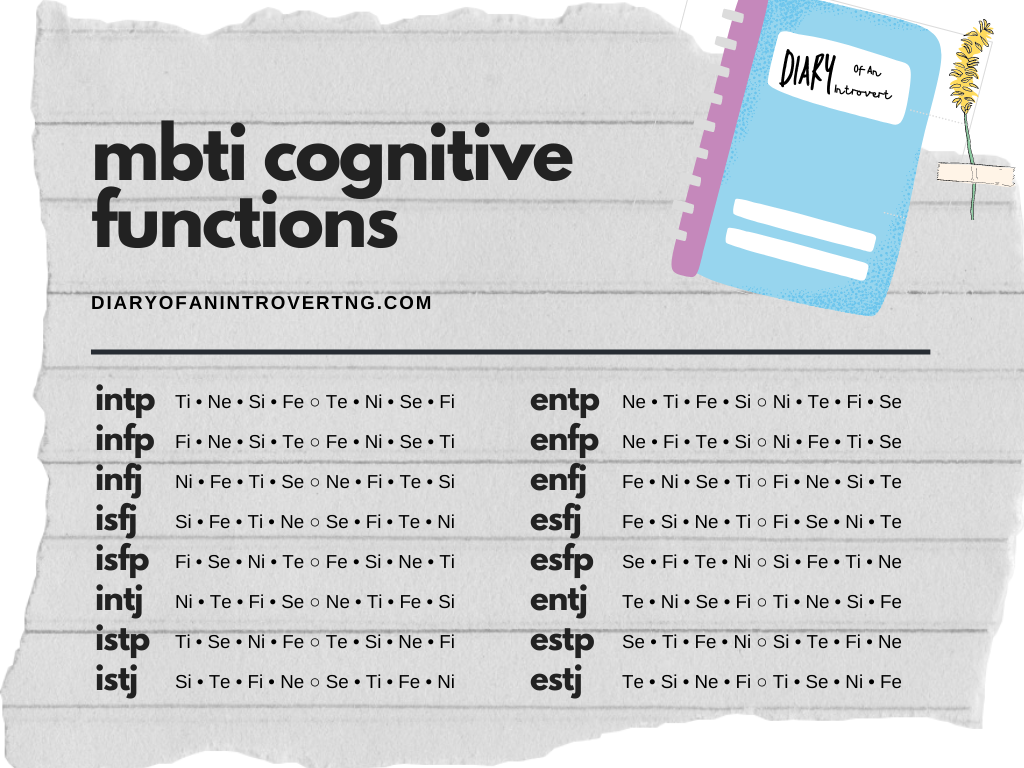The Easy Reader's Guide to the Eight MBTI Cognitive Functions
Most people want an all-in-one cognitive functions definition. If you’re looking to find out everything about the cognitive functions test MBTI in simple terms, you’re in the right place. This article has the cognitive functions, and even better, the MBTI cognitive functions explained to help you understand your personality even better.
We divided this article into five major sections. First, we’ll look at the cognitive functions meaning and the cognitive functions of the brain. Secondly, we’ll see the cognitive functions examples, and more importantly, the cognitive functions MBTI explained in full detail.
Next, we’ll look at the best cognitive functions test to help you identify how people make decisions and see the world. Lastly, we’ll look at the function stack, the MBTI test cognitive functions, and then proceed to how to improve cognitive functions.
What are Cognitive Functions?
Before we begin, what are the cognitive functions? Cognitive functions are a person’s mental processes or abilities. These are the areas in a person’s brain responsible for perception, thinking, reason, memory, problem-solving, attention, and decision making. Understand that people’s cognitive functions work differently, and play a crucial role in their everyday behavior. Knowing these functions can also help you understand them better.
The Cognitive Functions of the Brain
Carl Jung, the founder of analytical psychology, provided pioneering knowledge on the subject of cognitive functions. He referred to it as the Jung cognitive functions.
He broke down these roles into four major sections, which are the thinking, feeling, sensing, and intuition functionalities. He also intuitively invented the terms introvert and extrovert, giving clear discrepancies of how individuals’ minds operate.
These terms were later utilized by Katherine Cook Briggs and Isabel Briggs Myers to form the Myers-Briggs Type Indicator (MBTI), which is now called the MBTI cognitive functions.
The MBTI cognitive functions test has gained popularity since then. But to be able to understand people’s personality types (especially yours), you need a clearer view of each cognitive function that was used to form the four letters of the MBTI test results. Let’s take a look.
Introversion and Extroversion
Introversion and extroversion are terms that explain the way people’s minds work. People that exhibit introversion are called introverts, while those that display extroversion are called extroverts.
Introverts have calm personalities and prefer minimally stimulating environments. This is because they have higher brain activity than in other individuals, and tend to balance these processes with reduced external activities.
Extroverts, on the other hand, get their mental energy from external influences like people and places. This explains their jovial temperaments. Scientifically, extroverts have less neurochemical stimulation and seek out triggers from the external world.
2. Judging Functions
Judging functions are the cognitive functions responsible for making decisions. There are two main mental processes responsible for this action, such as:
Thinking
The thinking role is responsible for making rational or logical decisions. This is when we lean more to our heads for decision-making.
Feeling
The feeling role on the other hand makes decisions based on the heart, and sometimes, these actions might not seem reasonable to logical folks.
3. Perceiving Functions
Perceiving functions are responsible for how we see the world. There are also two roles responsible for this action, such as:
Sensing
This is the part of the brain that focuses on the present. It uses all five senses such as taste, sound, sight, touch, and smell to assimilate the world.
Intuition
This is the part of the brain responsible for insight. It pays attention to the bigger picture of things and uses past and present experiences to understand the world.
Related: Am I Too Quiet? P.S. No, You’re Not. A How-To Guide to Using Your Introversion to Your Advantage
The 8 Cognitive Functions
The Jungian cognitive functions can be categorized into eight main examples of cognitive functions. These previously listed cognitive functions (brain) will further give insight to the eight cognitive functions listed below. Let’s take a look.
1. Extroverted Thinking (Te).
Extroverted thinking is a judging function that uses physical influences to make decisions. It focuses on facts, workable strategies, and things happening in real-time to make judgments. People with this function are deemed rational/logical because they are more concerned about theories.
2. Introverted Thinking (Ti).
Introverted thinking is a judging function that involves making decisions internally and independent of external/physical influences. People with this function are more concerned about strategies that make sense to them. Therefore, they take actions based on personal principles or how things will affect them, and not because of what others think.
3. Extroverted Feeling (Fe).
Extroverted feeling is a judging function that involves making emotional decisions based on external factors, like how people feel about your choices. People with this function are incredibly empathetic, absorbing the emotions of others almost to the extent that they can’t tell it apart from theirs. Therefore, their happiness relies on others feeling happy too.
4. Introverted Feeling (Fi).
Introverted feeling is also a judging function that involves making emotional decisions without external influences. People with this function are more concerned about how things will affect them personally. They look more to their preferences than how people around them feel.
5. Extroverted Sensing (Se).
Extroverted sensing is a perceiving function that seeks to understand the physical world in real-time. It uses the five senses such as taste, smell, touch, sight, and sound to process information about the world. It can involve activities like cooking, painting, and other spontaneous activities.
6. Introverted Sensing (Si).
Introverted sensing is a perceiving function that seeks to understand the world from an internal view. It focuses more on memories or present experiences to vividly understand life's events. Therefore, people using this function don’t perceive the world from an external view.
7. Extroverted Intuition (Ne).
Extroverted intuition is a perceiving function that seeks to gain insight or see the bigger picture of things using external sources. People with this function try to see patterns in the world and connections between people. In other words, it’s a brainstorming process using physical factors.
8. Introverted Intuition (Ni).
Introverted intuition is a perceiving function that occurs in the mind. People with this function don’t need to focus on physical factors to have a clearer picture of things. Their insight almost comes from nowhere, or perhaps, something they’ve picked up over the years. Such people tend to have ‘Aha!’ moments.
The Function Stack MBTI
We can’t define cognitive functions without talking about the function stack. This is the order in which the list of cognitive functions is placed. It starts with the higher cognitive functions which are more dominant and goes all the way down to the weakest one.
The first four (1-4) are what form a person’s character, while the last four (5-8) are subconscious functions.
1. Dominant Function.
The dominant function is the strongest and most developed function in any individual. The role of this function is to play the hero, and it forms most of a person’s character. It also helps them save the day when faced with a critical challenge. By a person’s teenage years, this function has developed, forming most of their personality.
2. Auxiliary Function.
The Auxiliary function is the second strongest function in a person’s brain. Its role is to support the first function. Therefore, it can otherwise be called the supportive or parent part. Both the first and second functions make up ninety percent of a person’s character. Since this role is a helping one, people usually use it when they want to help someone or to be supportive.
3. Tertiary Function.
The Tertiary function is mostly weak and inaccessible to most individuals. It develops during mid-life, which is why people may not get accustomed to its workings. Nonetheless, the role of this part is for relief. If it eventually develops in a person’s brain, it is mostly used for recreational, stress-free purposes. It helps people connect with a deeper part of themselves.
4. Inferior Function.
The Inferior function is weaker than the third and also almost inaccessible. It’s a role that individuals would struggle with. If they try activities with this part, they’d feel inferior or experience shame. Nevertheless, it’s something they’ll aspire to learn. That’s why the function of this role is also called an aspirational function. If anyone learns to use this, they’ll tap into their pool of subconscious creativity.
5. Opposing Function.
The Opposing function is the fifth function that’s too weak to even use. It’s in the subconscious of a person, where they can’t control. Usually, it’s hard to rely on, and when someone needs to use it, they often can’t access it. This role serves as a defense, and a person might be stubborn about doing activities with this role, majorly because they won’t enjoy it.
6. Critical Function.
The Critical function is also a subconscious function. If a person engages in activities that rely on it, they are most likely to get overly critical about themselves. This is because they’re not particularly good at this role. It would require a great deal of concentration or energy to perform any task involving it effectively. This part might also make a person critical of others.
7. Trickster Function.
The Trickster function falls further down the line of the subconscious functions. However, when a person unconsciously does activities involving this function, it distorts everything about their personality. Therefore, people don’t enjoy using this role. It makes them uncomfortable, as though they’re going against their beliefs or principles.
8. Transformative Function.
The Transformative function is the last function that no one has control over. However, activities involving the role are capable of changing the course of a person’s life, either negatively or positively. It’s not an easy part, which is why using it will transform you. It can propel you into greater heights of maturity or personal growth or pull you down, depending on how it is used.
Liking this article? Join our Introvert Club→
The MBTI Cognitive Functions Chart
Now that we know the Myers Briggs cognitive functions and their stack, it is necessary to know the cognitive functions chart for each MBTI personality type. This will give you better insight into why you act the way you do.
Knowing the cognitive functions Myers Briggs in its respective order for your type will also help you identify your strengths and weaknesses. More so, it’ll help you understand the seemingly difficult people in your life, helping you know how to associate with them.
Recall that the first four functions are accessible and determine a person’s character, while the last four are subconscious functions that you can’t control.
1. INTP Cognitive Functions.
Ti • Ne • Si • Fe ○ Te • Ni • Se • Fi
An INTP’s strongest function is Introverted Thinking (making decisions internally and independent of external or physical influences). Their supporting function is Extroverted Intuition (seeing the bigger picture about life using people and other physical factors). This contributes to most of their character.
They use the Introverted Sensing (focusing more on memories to understand life's events) for relief and recreational purposes and might feel inferior or aspire to be better at Extroverted Feeling (making emotional decisions based on external factors, like how people feel about your choices).
They are stubborn about Extroverted Thinking (focusing on facts, workable strategies, and things happening in real-time to make judgments) because it is a weak function and they don’t enjoy it. They are overly critical about themselves with Introverted Intuition (seeing the bigger picture about life from within and without any physical factor) because it’s also weak and requires great strength to perform activities with it.
Extroverted Sensing (using the five senses such as taste, smell, touch, sight, and sound to process information about the world) distorts everything they know because they’re not accustomed to it, while Introverted Feeling (making decisions based on how things will affect them personally), the weakest, is capable of transforming them either negatively or positively.
2. ENTP Cognitive Functions.
Ne • Ti • Fe • Si ○ Ni • Te • Fi • Se
An ENTP’s strongest function is the Extroverted Intuition (seeing the bigger picture about life using people and other physical factors). Their supporting function is Introverted Thinking (making decisions internally and independent of external or physical influences), which contributes to most of their character.
They use the Extroverted Feeling (making emotional decisions based on external factors, like how people feel about your choices) for relief and recreational purposes, and might feel inferior or aspire to be better at Introverted Sensing (focusing more on memories to understand life's events).
They are stubborn about Introverted Intuition (seeing the bigger picture about life from within and without any physical factor) because it is a weak function and they don’t enjoy it. They are overly critical about themselves with Extroverted Thinking (focusing on facts, workable strategies, and things happening in real-time to make judgments) because it’s also weak and requires great strength to perform activities with it.
Introverted Feeling (making decisions based on how things will affect them personally) distorts everything they know because they’re not accustomed to it, while Extroverted Sensing (using the five senses such as taste, smell, touch, sight, and sound to process information about the world), the weakest, is capable of transforming them either negatively or positively.
3. INFP Cognitive Functions.
Fi • Ne • Si • Te ○ Fe • Ni • Se • Ti
The cognitive functions INFP, from the strongest, is the Introverted Feeling (making decisions based on how things will affect them personally). Their supporting function is Extroverted Intuition (seeing the bigger picture about life using people and other physical factors), which contributes to most of their character.
They use Introverted Sensing (focusing more on memories to understand life's events) for relief and recreational purposes, and might feel inferior or aspire to be better at Extroverted Thinking (focusing on facts, workable strategies, and things happening in real-time to make judgments).
They are stubborn about Extroverted Feeling (making emotional decisions based on external factors, like how people feel about your choices) because it is a weak function and they don’t enjoy it. They are overly critical about themselves with Introverted Intuition (seeing the bigger picture about life from within and without any physical factor) because it’s also weak and requires great strength to perform activities with it.
Extroverted Sensing (using the five senses such as taste, smell, touch, sight, and sound to process information about the world) distorts everything they know because they’re not accustomed to it, while Introverted Thinking (making decisions internally and independent of external or physical influences), the weakest, is capable of transforming them either negatively or positively.
4. ENFP Cognitive Functions.
Ne • Fi • Te • Si ○ Ni • Fe • Ti • Se
An ENFP’s strongest function is the Extroverted Intuition (seeing the bigger picture about life using people and other physical factors). Their supporting function is the Introverted Feeling (making decisions based on how things will affect them personally), which contributes to most of their character.
They use Extroverted Thinking (focusing on facts, workable strategies, and things happening in real-time to make judgments) for relief and recreational purposes, and might feel inferior or aspire to be better at Introverted Sensing (focusing more on memories to understand life's events).
They are stubborn about Introverted Intuition (seeing the bigger picture about life from within and without any physical factor) because it is a weak function and they don’t enjoy it. They are overly critical about themselves with Extroverted Feeling (making emotional decisions based on external factors, like how people feel about your choices) because it’s also weak and requires great strength to perform activities with it.
Introverted Thinking (making decisions internally and independent of external or physical influences) distorts everything they know because they’re not accustomed to it, while Extroverted Sensing (using the five senses such as taste, smell, touch, sight, and sound to process information about the world), the weakest, is capable of transforming them either negatively or positively.
5. INFJ Cognitive Functions.
Ni • Fe • Ti • Se ○ Ne • Fi • Te • Si
The cognitive functions INFJ, from the strongest, is the Introverted Intuition (seeing the bigger picture about life from within and without any physical factor). Their supporting function is the Extroverted Feeling (making emotional decisions based on external factors, like how people feel about their choices), which contributes to most of their character.
They use Introverted Thinking (making decisions internally and independent of external or physical influences) for relief and recreational purposes and might feel inferior or aspire to be better at Extroverted Sensing (using the five senses such as taste, smell, touch, sight, and sound to process information about the world).
They are stubborn about Extroverted Intuition (seeing the bigger picture about life using people and other physical factors) because it is a weak function and they don’t enjoy it. They are overly critical about themselves with Introverted Feeling (making decisions based on how things will affect them personally) because it’s also weak and requires great strength to perform activities with it.
Extroverted Thinking (focusing on facts, workable strategies, and things happening in real-time to make judgments) distorts everything they know because they’re not accustomed to it, while Introverted Sensing (focusing more on memories to understand life's events), the weakest, is capable of transforming them either negatively or positively.
6. ENFJ Cognitive Functions.
Fe • Ni • Se • Ti ○ Fi • Ne • Si • Te
An ENFJ’s strongest function is the Extroverted Feeling (making emotional decisions based on external factors, like how people feel about your choices). Their supporting function is the Introverted Intuition (seeing the bigger picture about life from within and without any physical factor), which contributes to most of their character.
They use Extroverted Sensing (using the five senses such as taste, smell, touch, sight, and sound to process information about the world) for relief and recreational purposes, and might feel inferior or aspire to be better at Introverted Thinking (making decisions internally and independent of external or physical influences).
They are stubborn about Introverted Feeling (making decisions based on how things will affect them personally) because it is a weak function and they don’t enjoy it. They are overly critical about themselves with Extroverted Intuition (seeing the bigger picture about life using people and other physical factors) because it’s also weak and requires great strength to perform activities with it.
Introverted Sensing (focusing more on memories to understand life's events) distorts everything they know because they’re not accustomed to it, while Extroverted Thinking (focusing on facts, workable strategies, and things happening in real-time to make judgments), the weakest, is capable of transforming them either negatively or positively.
7. ISFJ Cognitive Functions.
Si • Fe • Ti • Ne ○ Se • Fi • Te • Ni
An ISFJ’s strongest function is Introverted Sensing (focusing more on memories to understand life's events). Their supporting function is the Extroverted Feeling (making emotional decisions based on external factors, like how people feel about your choices), which contributes to most of their character.
They use Introverted Thinking (making decisions internally and independent of external or physical influences) for relief and recreational purposes and might feel inferior or aspire to be better at Extroverted Intuition (seeing the bigger picture about life using people and other physical factors).
They are stubborn about Extroverted Sensing (using the five senses such as taste, smell, touch, sight, and sound to process information about the world) because it is a weak function and they don’t enjoy it. They are overly critical about themselves with Introverted Feeling (making decisions based on how things will affect them personally) because it’s also weak and requires great strength to perform activities with it.
Extroverted Thinking (focusing on facts, workable strategies, and things happening in real-time to make judgments) distorts everything they know because they’re not accustomed to it, while Introverted Intuition (seeing the bigger picture about life from within and without any physical factor), the weakest, is capable of transforming them either negatively or positively.
8. ESFJ Cognitive Functions.
Fe • Si • Ne • Ti ○ Fi • Se • Ni • Te
An ESFJ’s strongest function is the Extroverted Feeling (making emotional decisions based on external factors, like how people feel about your choices). Their supporting function is Introverted Sensing (focusing more on memories to understand life's events), which contributes to most of their character.
They use the Extroverted Intuition (seeing the bigger picture about life using people and other physical factors) for relief and recreational purposes and might feel inferior or aspire to be better at Introverted Thinking (making decisions internally and independent of external or physical influences).
They are stubborn about Introverted Feeling (making decisions based on how things will affect them personally) because it is a weak function and they don’t enjoy it. They are overly critical about themselves with Extroverted Sensing (using the five senses such as taste, smell, touch, sight, and sound to process information about the world) because it’s also weak and requires great strength to perform activities with it.
Introverted Intuition (seeing the bigger picture about life from within and without any physical factor) distorts everything they know because they’re not accustomed to it, while Extroverted Thinking (focusing on facts, workable strategies, and things happening in real-time to make judgments), the weakest, is capable of transforming them either negatively or positively.
9. ISFP Cognitive Functions.
Fi • Se • Ni • Te ○ Fe • Si • Ne • Ti
An ISFP’s strongest function is Introverted Feeling (making decisions based on how things will affect them personally). Their supporting function is Extroverted Sensing (using the five senses such as taste, smell, touch, sight, and sound to process information about the world), which contributes to most of their character.
They use the Introverted Intuition (seeing the bigger picture about life from within and without any physical factor) for relief and recreational purposes and might feel inferior or aspire to be better at Extroverted Thinking (focusing on facts, workable strategies, and things happening in real-time to make judgments).
They are stubborn about Extroverted Feeling (making emotional decisions based on external factors, like how people feel about your choices) because it is a weak function and they don’t enjoy it. They are overly critical about themselves with Introverted Sensing (focusing more on memories to understand life's events) because it’s also weak and requires great strength to perform activities with it.
Extroverted Intuition (seeing the bigger picture about life using people and other physical factors) distorts everything they know because they’re not accustomed to it, while Introverted Thinking (making decisions internally and independent of external or physical influences), the weakest, is capable of transforming them either negatively or positively.
10. ESFP Cognitive Functions.
Se • Fi • Te • Ni ○ Si • Fe • Ti • Ne
An ESFP’s strongest function is Extroverted Sensing (using the five senses such as taste, smell, touch, sight, and sound to process information about the world). Their supporting function is Introverted Feeling (making decisions based on how things will affect them personally), which contributes to most of their character.
They use Extroverted Thinking (focusing on facts, workable strategies, and things happening in real-time to make judgments) for relief and recreational purposes, and might feel inferior or aspire to be better at Introverted Intuition (seeing the bigger picture about life from within and without any physical factor).
They are stubborn about Introverted Sensing (focusing more on memories to understand life's events) because it is a weak function and they don’t enjoy it. They are overly critical about themselves with Extroverted Feeling (making emotional decisions based on external factors, like how people feel about your choices) because it’s also weak and requires great strength to perform activities with it.
Introverted Thinking (making decisions internally and independent of external or physical influences) distorts everything they know because they’re not accustomed to it, while Extroverted Intuition (seeing the bigger picture about life using people and other physical factors), the weakest, is capable of transforming them either negatively or positively.
11. INTJ Cognitive Functions.
Ni • Te • Fi • Se ○ Ne • Ti • Fe • Si
An INTJ’s strongest function is Introverted Intuition (seeing the bigger picture about life from within and without any physical factor). Their supporting function is Extroverted Thinking (focusing on facts, workable strategies, and things happening in real-time to make judgments), which contributes to most of their character.
They use Introverted Feeling (making decisions based on how things will affect them personally) for relief and recreational purposes and might feel inferior or aspire to be better at Extroverted Sensing (using the five senses such as taste, smell, touch, sight, and sound to process information about the world).
They are stubborn about Extroverted Intuition (seeing the bigger picture about life using people and other physical factors) because it is a weak function and they don’t enjoy it. They are overly critical about themselves with Introverted Thinking (making decisions internally and independent of external or physical influences) because it’s also weak and requires great strength to perform activities with it.
Extroverted Feeling (making emotional decisions based on external factors, like how people feel about your choices) distorts everything they know because they’re not accustomed to it, while Introverted Sensing (focusing more on memories to understand life's events), the weakest, is capable of transforming them either negatively or positively.
12. ENTJ Cognitive Functions.
Te • Ni • Se • Fi ○ Ti • Ne • Si • Fe
An ENTJ’s strongest function is Extroverted Thinking (focusing on facts, workable strategies, and things happening in real-time to make judgments). Their supporting function is the Introverted Intuition (seeing the bigger picture about life from within and without any physical factor), contributing to most of their character.
They use Extroverted Sensing (using the five senses such as taste, smell, touch, sight, and sound to process information about the world) for relief and recreational purposes, and might feel inferior or aspire to be better at Introverted Feeling (making decisions based on how things will affect them personally).
They are stubborn about Introverted Thinking (making decisions internally and independent of external or physical influences) because it is a weak function and they don’t enjoy it. They are overly critical about themselves with Extroverted Intuition (seeing the bigger picture about life using people and other physical factors) because it’s also weak and requires great strength to perform activities with it.
Introverted Sensing (focusing more on memories to understand life's events) distorts everything they know because they’re not accustomed to it, while Extroverted Feeling (making emotional decisions based on external factors, like how people feel about your choices), the weakest, is capable of transforming them either negatively or positively.
13. ISTP Cognitive Functions.
Ti • Se • Ni • Fe ○ Te • Si • Ne • Fi
An ISTP’s strongest function is Introverted Thinking (making decisions internally and independent of external or physical influences). Their supporting function is Extroverted Sensing (using the five senses such as taste, smell, touch, sight, and sound to process information about the world), which contributes to most of their character.
They use Introverted Intuition (seeing the bigger picture about life from within and without any physical factor) for relief and recreational purposes and might feel inferior or aspire to be better at Extroverted Feeling (making emotional decisions based on external factors, like how people feel about your choices).
They are stubborn about Extroverted Thinking (focusing on facts, workable strategies, and things happening in real-time to make judgments) because it is a weak function and they don’t enjoy it. They are overly critical about themselves with Introverted Sensing (focusing more on memories to understand life's events) because it’s also weak and requires great strength to perform activities with it.
Extroverted Intuition (seeing the bigger picture about life using people and other physical factors) distorts everything they know because they’re not accustomed to it, while Introverted Feeling (making decisions based on how things will affect them personally), the weakest, is capable of transforming them either negatively or positively.
14. ESTP Cognitive Functions.
Se • Ti • Fe • Ni ○ Si • Te • Fi • Ne
An ESTP’s strongest function is Extroverted Sensing (using the five senses such as taste, smell, touch, sight, and sound to process information about the world). Their supporting function is Introverted Thinking (making decisions internally and independent of external or physical influences), contributing to most of their character.
They use Extroverted Feeling (making emotional decisions based on external factors, like how people feel about your choices) for relief and recreational purposes, and might feel inferior or aspire to be better at Introverted Intuition (seeing the bigger picture about life from within and without any physical factor).
They are stubborn about Introverted Sensing (focusing more on memories to understand life's events) because it is a weak function and they don’t enjoy it. They are overly critical about themselves with Extroverted Thinking (focusing on facts, workable strategies, and things happening in real-time to make judgments) because it’s also weak and requires great strength to perform activities with it.
Introverted Feeling (making decisions based on how things will affect them personally) distorts everything they know because they’re not accustomed to it, while Extroverted Intuition (seeing the bigger picture about life using people and other physical factors), the weakest, is capable of transforming them either negatively or positively.
15. ISTJ Cognitive Functions.
Si • Te • Fi • Ne ○ Se • Ti • Fe • Ni
An ISTJ’s strongest function is Introverted Sensing (focusing more on memories to understand life's events). Their supporting function is Extroverted Thinking (focusing on facts, workable strategies, and things happening in real-time to make judgments), which contributes to most of their character.
They use Introverted Feeling (making decisions based on how things will affect them personally) for relief and recreational purposes and might feel inferior or aspire to be better at Extroverted Intuition (seeing the bigger picture about life using people and other physical factors).
They are stubborn about Extroverted Sensing (using the five senses such as taste, smell, touch, sight, and sound to process information about the world) because it is a weak function and they don’t enjoy it. They are overly critical about themselves with Introverted Thinking (making decisions internally and independent of external or physical influences) because it’s also weak and requires great strength to perform activities with it.
Extroverted Feeling (making emotional decisions based on external factors, like how people feel about your choices) distorts everything they know because they’re not accustomed to it, while Introverted Intuition (seeing the bigger picture about life from within and without any physical factor), the weakest, is capable of transforming them either negatively or positively.
16. ESTJ Cognitive Functions.
Te • Si • Ne • Fi ○ Ti • Se • Ni • Fe
The Executive cognitive functions, starting from the strongest, is Extroverted Thinking (focusing on facts, workable strategies, and things happening in real-time to make judgments). Their supporting function is Introverted Sensing (focusing more on memories to understand the events about life), which contributes to most of their character.
They use Extroverted Intuition (seeing the bigger picture about life using people and other physical factors) for relief and recreational purposes and might feel inferior or aspire to be better at Introverted Feeling (making decisions based on how things will affect them personally).
They are stubborn about Introverted Thinking (making decisions internally and independent of external or physical influences) because it is a weak function and they don’t enjoy it. They are overly critical about themselves with Extroverted Sensing (using the five senses such as taste, smell, touch, sight, and sound to process information about the world) because it’s also weak and requires great strength to perform activities with it.
Introverted Intuition (seeing the bigger picture about life from within and without any physical factor) distorts everything they know because they’re not accustomed to it, while Extroverted Feeling (making emotional decisions based on external factors, like how people feel about your choices), the weakest, is capable of transforming them either negatively or positively.
How to Know the Functions of Each MBTI Personality Type
Photo by Microsoft Edge on Unsplash
Here’s an easy cognitive functions MBTI test for each Myers Briggs personality type. You can use it to remember your friend or loved one’s MBTI function stack without necessarily needing to memorize or search for it again.
Hint: Matched traits equal extroverted cognitive function, while unmatched traits equal introverted cognitive function. (You’ll understand better as you continue reading.)
Thinking and Judging Traits (TJs)
These are the ISTJ, INTJ, ESTJ, and ENTJ personalities. An intuitive Jung cognitive functions test is remembering that thinking is a judging function, Therefore, the TJs have the extroverted thinking cognitive function as either a dominant or auxiliary role.
2. Feeling and Judging Traits (FJs)
These are the ISFJ, INFJ, ESFJ, and ENFJ personalities. A great 8 cognitive functions test is remembering that feeling is a judging function, Therefore, the FJs have the extroverted feeling cognitive function as either a dominant or auxiliary role.
3. Thinking and Prospecting Traits (TPs)
These are the ISTP, INTP, ESTP, and ENTP personalities. An easy cognitive functions test (Jung) is remembering that thinking is not a perceiving function, Therefore, the TPs have the introverted thinking cognitive function as either a dominant or auxiliary role.
4. Feeling and Prospecting Traits (FPs)
These are the ISFP, INFP, ESFP, and ENFP personalities. An easy cognitive functions test is remembering that feeling is not a perceiving function, Therefore, the FPs have the introverted feeling cognitive function as either a dominant or auxiliary role.
5. Intuition and Judging Traits (N and Js)
These are the INTJ, INFJ, ENTJ, and ENFJ personalities. Remember that intuition is not a judging function, Therefore, the N and Js have the introverted intuition cognitive function as either a dominant or auxiliary role.
6. Sensing and Judging Traits (S and Js)
These are the ISTJ, ISFJ, ESTJ, and ESFJ personalities. Remember that sensing is not a judging function, Therefore, the S and Js have the introverted sensing cognitive function as either a dominant or auxiliary role.
7. Intuition and Prospecting Traits (N and Ps)
These are the INTP, INFP, ENTP, and ENFP personalities. Remember that intuition is a perceiving function, Therefore, the FPs have the extroverted intuition cognitive function as either a dominant or auxiliary role.
8. Sensing and Prospecting Traits (S and Ps)
These are the ISTP, ISFP, ESTP, and ESFP personalities. Remember that sensing is a perceiving function, Therefore, the FPs have the extroverted sensing cognitive function as either a dominant or auxiliary role.
Identifying the Function Stack of Anyone Without Knowing their MBTI Type
Here’s a quick Jungian cognitive functions test to detect a person’s cognitive function even without knowing their personality type.
The Introverts
The dominant function of introverts will always be introverted, while their auxiliary function will be extroverted. Since introverted functions emanate from the mind, it might be hard to detect introverts’ dominant functions from an external point of view.
Nonetheless, the auxiliary function will be obvious because it relies on external factors. This is why many need to know introverts first before understanding their core personalities.
2. The Extroverts
The dominant function of extroverts will always be extroverted, while their auxiliary function will be introverted. Therefore, it will be much easier to detect an extrovert’s core cognitive function by observing the way they make decisions or see the world.
How to Improve Cognitive Functions
Photo by Microsoft Edge on Unsplash
Remaining open to experiences, maintaining social connections, and having a curious and creative mind can improve a person’s cognitive function over some time. Other factors like ensuring you reduce stressful activity and engage in physical activities can also help.
FAQs
What are cognitive functions of the brain?
These are mental processes that enable us to receive and utilize information for decision-making and other core activities.
What part of the brain controls cognitive functions?
The frontal lobe is responsible for cognitive functions and other involuntary actions.
What are my cognitive functions?
The best way to know your cognitive function is by studying your MBTI results. Nevertheless, you can still determine them without taking the test.
How many cognitive functions are included in the MBTI formula?
There are a total of four cognitive functions in the MBTI formula, which are: thinking, feeling, sensing, and intuition functions.
How to find your cognitive functions?
You can find it by knowing your MBTI personality type or using the steps given above peradventure you’ve not taken the test.
Live Your Best Quiet Life
Get the Am I Too Quiet? book →
CONCLUSION
Did you enjoy this article? Try determining a friend or loved one’s cognitive function using the steps above and comment on your results. Kindly leave a comment below or share this article if you liked it.




















